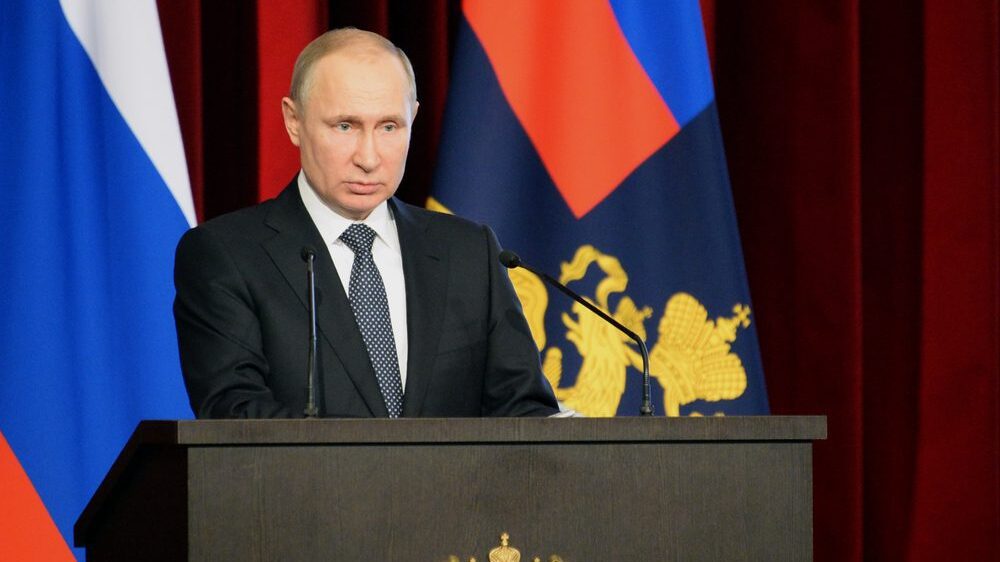
While top EU diplomats gathered on Monday, June 26th, in Luxembourg to make sense of last weekend’s mutiny by Prigozhin and his Wagernites, President Vladimir Putin delivered a speech the same night—hyped by Kremlin spokesperson Dmitry Peskov as an address that would “determine the future of Russia”—that left some Western observers underwhelmed.
In a five-minute address to the Russian people, which came hours after Prigozhin recorded a statement where he attempted to explain his motivations for this weekend’s rebellion, Putin said the mutiny threatened the state’s very existence, promised to punish the insurrection’s organizers, and praised patriot citizens and government officials that rallied behind “the fate of the Fatherland.”
With English-language subtitles, here is the full national address Putin made tonight in Russia. He made a very similar speech on Saturday, but this one was angrier. pic.twitter.com/u91LiKpkVE
— Kevin Rothrock (@KevinRothrock) June 26, 2023
The Russian president accused those who participated in the mutiny of betraying the nation and doing the bidding of Moscow’s foes, saying:
It was precisely this outcome—fratricide—that Russia’s enemies wanted: both the neo-Nazis in Kyiv, and their Western patrons, and all sorts of national traitors.
They wanted Russian soldiers to kill each other so that soldiers and civilians would die, so that in the end Russia would lose, and our society would break apart and choke on bloody civil strife. They rubbed their hands, dreaming of getting revenge for their failures at the front and during the so-called counteroffensive, but they miscalculated.
Predictably, Putin also lauded President Alexander Lukashenko for his “contribution to the peaceful resolution of the situation” and the Wagner fighters who “stopped at the last line” and prevented “fratricidal bloodshed” to take place.
Prigozhin, for his part, in an eleven-minute video recording, denied that the revolt’s aim was to overthrow the Russian state, saying Wagnerites “started the march because of injustice” and to “prevent the destruction” of the private military contractor.
The Wagner boss’s full statement can be heard here:
Alright, I got enough criticism of my previously animated Prigozhin video that I’ve decided to take it down. I thought it was an obvious joke, but it clearly confused too many people, so let’s try again: Prigozhin’s full post-insurrection audio clip, w English-language subtitles. pic.twitter.com/dd7oVzntIh
— Kevin Rothrock (@KevinRothrock) June 27, 2023
Earlier the same day, foreign ministers from the European Union’s 27 member states convened in Luxembourg in an attempt to make sense of the dramatic events that unfolded over the weekend.
“What has happened during this weekend shows that the war against Ukraine is cracking Russian power and affecting its political system,” Josep Borrell, the EU’s top diplomat claimed.
“The political system is showing its fragilities and the military power is cracking. So this is an important consequence of the war in Ukraine,” he said, adding that “the monster that Putin created with Wagner is biting him now.”
French Foreign Minister Catherine Colonna, for her part, gave a more measured assessment of the situation, insisting that the world has yet to see the “full consequences” of Prigozhin’s march on Moscow.
“Nevertheless, these events do raise a lot of questions, and perhaps more questions than answers,” she said. “At the moment, it is clear that [the events] have underlined the fact that there have been internal tensions and that there are even cracks, fractures, and flaws in the system.”
In light of the potentially explosive internal political situation in Russia, and with some speculating that the Kremlin may be transferring Wagner troops to Belarus, Gabrielius Landsbergis, Lithuania’s foreign minister, called on NATO allies to reinforce the European Union’s eastern flank.
“We’re seeing how fast things can transpire,” Landsbergis began. “It took half a day for a military detachment to move 200 kilometers away from Moscow. So imagine how fast they can do that crossing Belarus and appearing on Lithuania’s border.”
Germany promptly responded to Lithuania’s call, with German Defense Minister Boris Pistorius announcing on Monday plans to permanently station 4,000 troops in Lithuania to help secure the NATO member’s eastern flank.
The German defense ministry, however, has denied that the decision to move troops to Lithuania was influenced by Prigozhin’s march on Moscow.
Reactions from both the Finnish and Estonian foreign ministers were cautious. Finland’s Foreign Minister Elina Valtonen, who assumed her post last week, and Estonian Foreign Minister Margus Tsahkna were both sure to note that last weekend’s saga was an “internal” Russian matter.
“It’s too early to tell where this will lead … but it is pretty obvious that the events of the weekend will have a continued effect on how Putin is seen internally, but also how Russia is seen from the outside,” Valtonen said.
Estonian Foreign Minister Tsahkna said despite the internal events taking place in Russia, “The West will remain united— it is very important now that we focus now on supporting Ukraine.”
